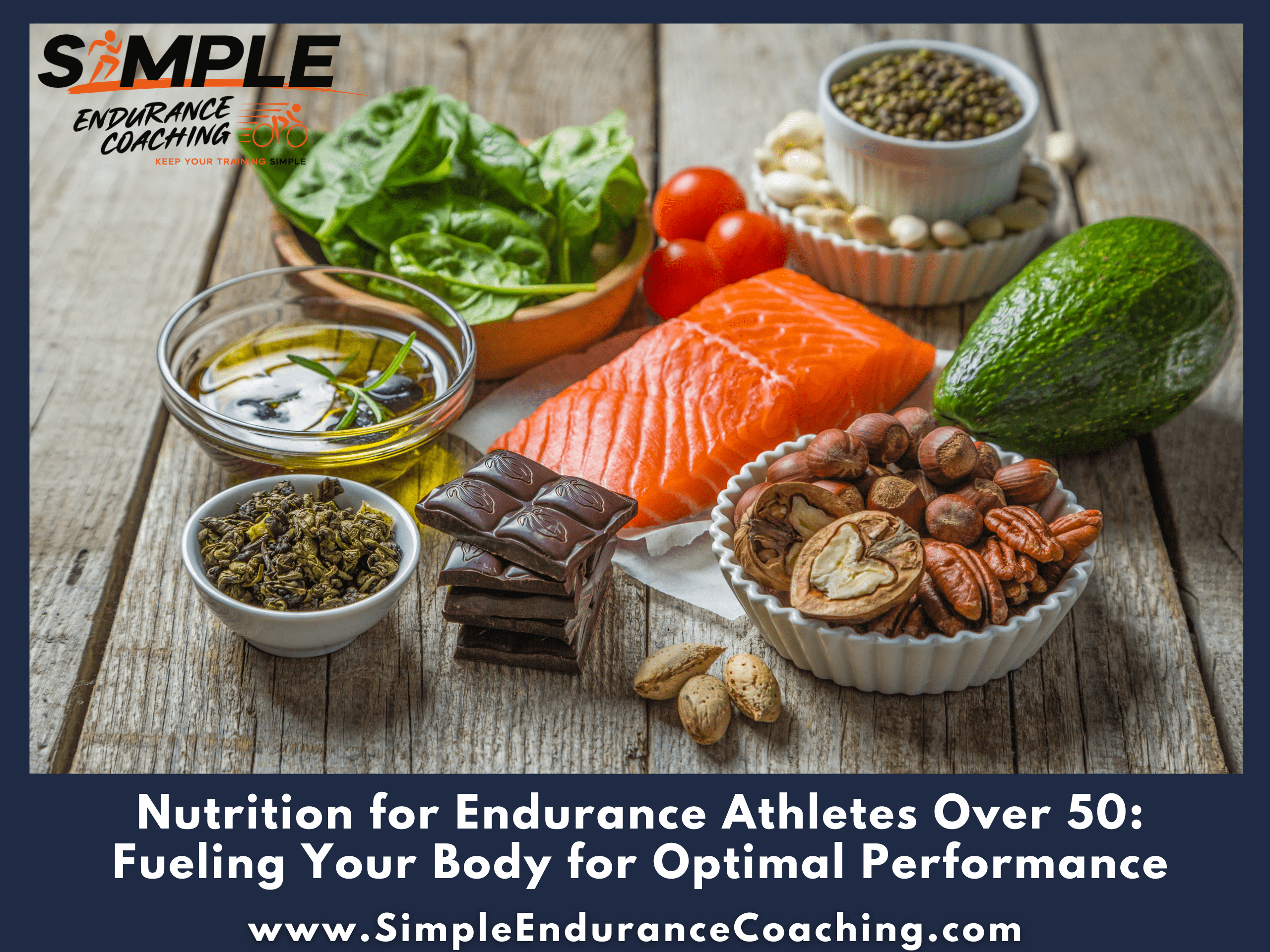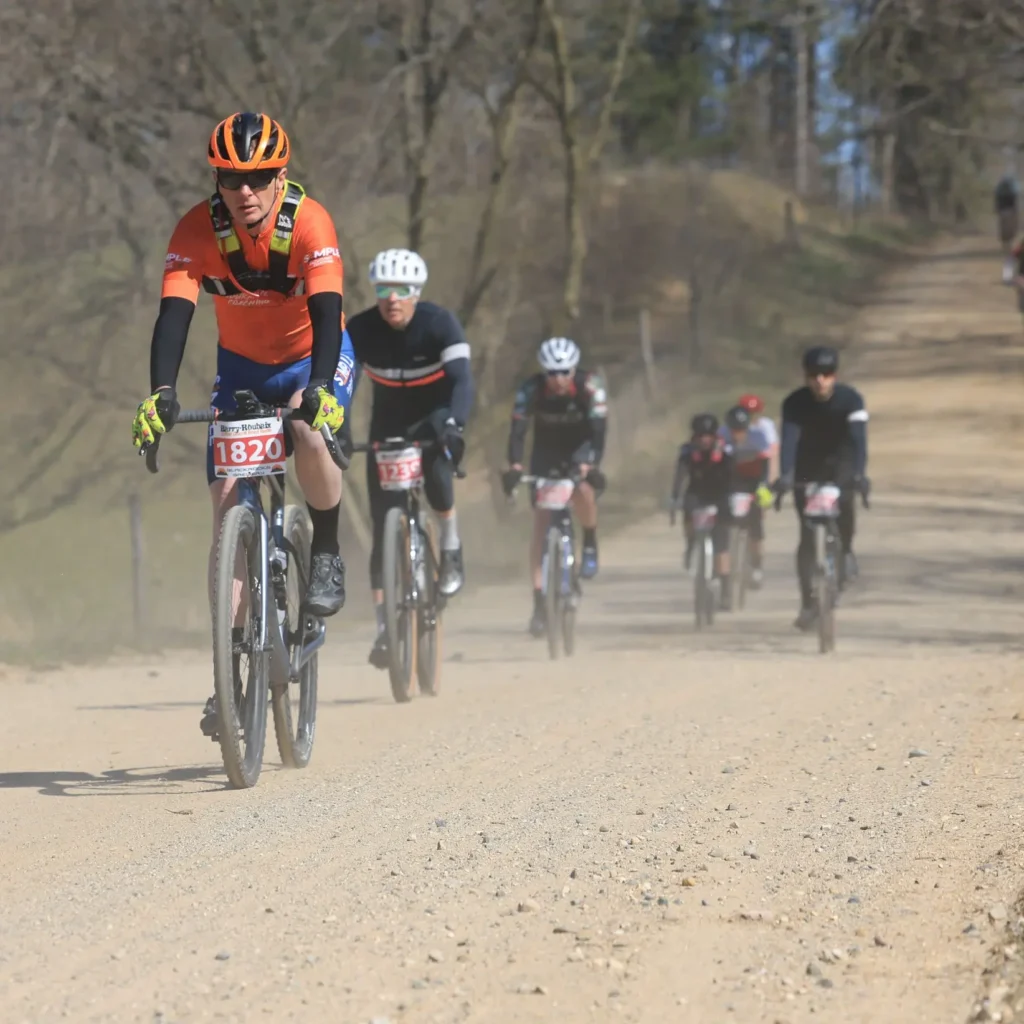As endurance athletes (cyclists, runners, triathletes, nordic skiers) over 50, understanding the specific nutritional needs of our bodies is crucial for maintaining optimal performance.
Aging affects metabolism, muscle mass, and recovery, thus requiring a more tailored approach to nutrition.
This article aims to provide you with some evidence-based strategies to fuel your body effectively for endurance training and competitions.
While many of us set particular goals this time of year, good nutrition can become a habit for good health.

Understanding the aging athlete’s body
As we get older, particularly after 50, our bodies undergo significant changes.
- Increased need for protein: Aging leads to a gradual loss of muscle mass (sarcopenia). Endurance athletes over 50, especially women, may need more protein than younger athletes to help preserve muscle mass, repair tissues, and support recovery. The quality of protein, including its amino acid composition, is also important. The general recommendation for older adults is 1.2 to 2.0 grams of protein per kilogram of body weight per day, depending on activity level and individual health conditions.
- Altered carbohydrate metabolism: The body’s ability to metabolize carbohydrates can change, often becoming less efficient. While carbohydrates remain a crucial energy source, older athletes might need to adjust their intake based on activity levels and monitor their glycemic control, especially if there are concerns about insulin sensitivity or type 2 diabetes.
- Attention to hydration: Older adults might experience a reduced sensation of thirst, which can lead to inadequate hydration. Proper hydration is essential for performance and recovery, and older athletes may need to be more mindful about drinking fluids regularly.
Key nutrients for endurance athletes over 50
For “senior” athlete nutrition, focus on key nutrients:
- Protein: Essential for muscle repair and growth. As an aging athlete, increasing your protein intake can help in maintaining muscle mass.
- Carbohydrates: The primary fuel source during endurance activities. Carbs help in sustaining energy levels throughout long training sessions or events.
- Fats: Good fats are necessary for long-term energy, hormone production, and cell health. As metabolism slows, the need for fats, particularly omega-3 fatty acids, becomes more prominent. These fats are essential for joint health and can help reduce inflammation, which is beneficial for endurance athletes dealing with regular wear and tear on their joints.
- Vitamins and Minerals: Particularly important are calcium and vitamin D for bone health, and B vitamins for energy metabolism. Bone density tends to decrease with age, making calcium and vitamin D crucial for maintaining bone strength. This is particularly important for endurance athletes to prevent stress fractures and other bone-related injuries.
Research indicates that a balanced diet rich in these nutrients can significantly improve performance and recovery in athletes over 50.
The best nutrition plans for athletes over 50
A balanced meal plan is key.
It should include a variety of fruits, vegetables, whole grains, lean proteins, and healthy fats.
The plan should be adjusted according to your training intensity and personal health conditions.
Consulting with a nutritionist can provide personalized guidance, especially if you have weight loss or weight gain goals.
In general, you should eat enough carbohydrates to sustain your training, enough protein to repair your damaged muscles, and enough fat to support long-term energy and cell health.
Nutrition timing for optimal performance
Nutrition timing is a game-changer for endurance athletes. Here’s a simple guide:
- Breakfast: Eat a balanced meal with fats, carbohydrates, and protein so that your HIIT or endurance training that day will be properly fueled.
- Pre-Workout: Focus on carbohydrates for immediate energy. A small, carb-rich snack 30-60 minutes before training is ideal, especially with HIIT workouts.
- During Workout: For sessions longer than an hour, consider a carbohydrate source to sustain energy.
- Post-Workout: Protein and carbs are crucial for recovery. Aim to eat within 30 minutes after your workout, adding protein, particularly after strength training.
- Hydration is equally important. Drink water consistently before, during, and after your workouts, even if you’re doing recovery yoga.
If you are doing lots of endurance training for gravel racing, cyclocross, triathlon, or trail running, you’ll need to eat enough to support your workouts.
Common nutritional challenges and solutions
Aging might bring challenges like decreased appetite or digestive issues.
Opt for nutrient-dense foods and consider smaller, more frequent meals.
For those with specific dietary needs, seek alternatives that meet your nutritional requirements without causing discomfort.
There has been an increasing amount of research suggesting that a lower-carbohydrate, higher-fat diet is a healthier long-term option, rather than the carbohydrate-heavy nutrition most of us endurance athletes consume now.
That’s another blog post!
Nutrition helps you maintain peak performance
Proper nutrition is a cornerstone of achieving and maintaining peak performance in endurance sports, especially for athletes over 50.
Remember, while these guidelines are a great starting point, consulting with a healthcare professional for a personalized plan is always recommended.
Stay motivated and nourished to keep achieving your athletic goals!
How do you manage your nutrition as an over-50 endurance athlete?
Three things everyday endurance athletes over 50 should know about nutrition:
- Focus on a balance of protein, carbohydrates, and fat.
- Make sure you’re getting enough protein, probably more than you think.
- Time your nutrition to fuel your performance.
Need more?
Unlock the secrets to mastering gravel racing with our FREE Guide to Gravel Racing! Get yours here.
BOOK A CALL so we can discuss your goals, answer questions, and talk about making your endurance training more effective, fun, and Simple.
Paul Warloski is a:
- USA Cycling Level 1 Advanced Certified Coach
- RRCA Running Coach
- Training Peaks Level 2 Coach
- RYT-200 Yoga Instructor
- Certified Personal Trainer
- Certified Nutrition Advisor




